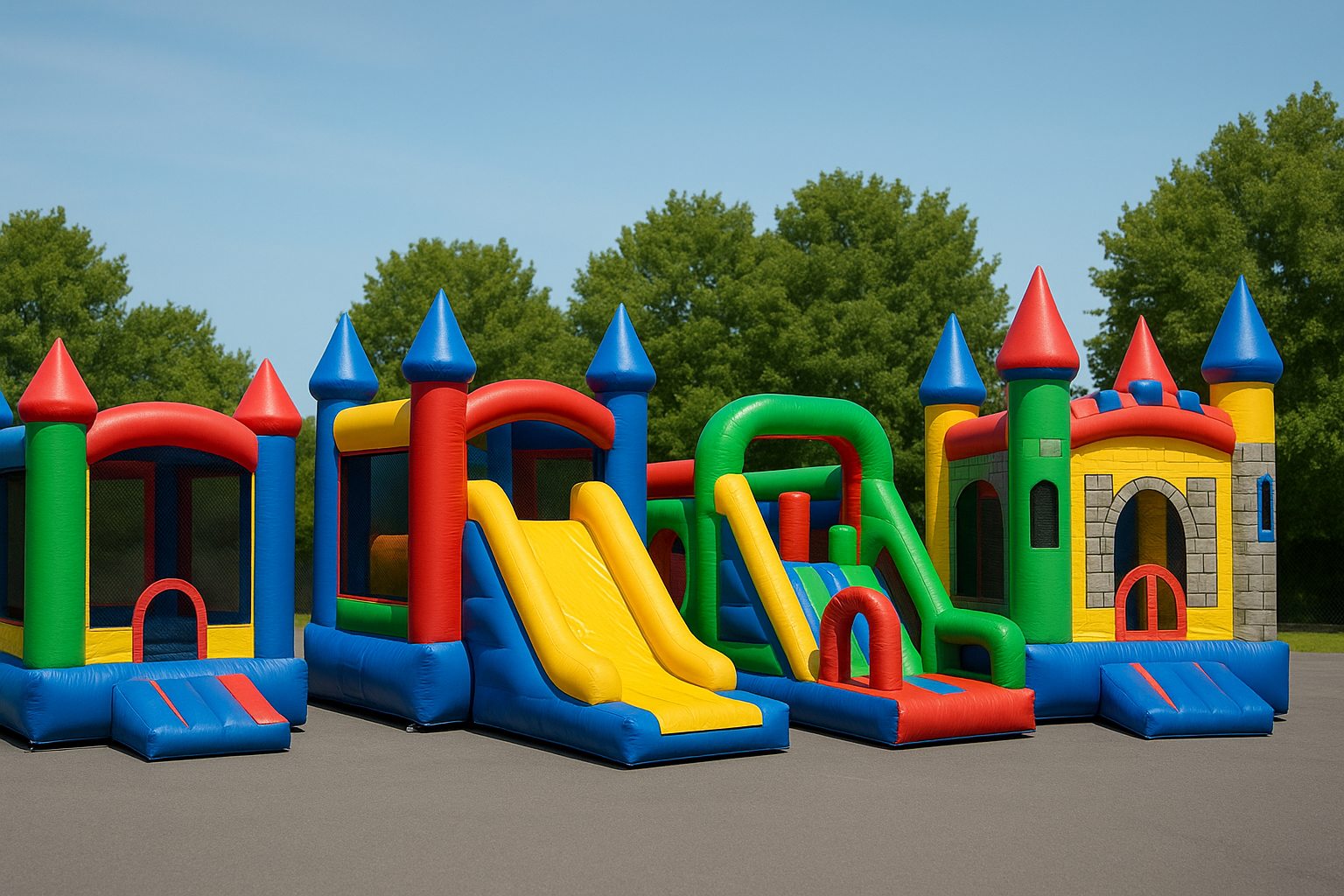When it comes to bringing fun and excitement to your backyard, inflatable bounce houses are a fantastic option for kids of all ages. However, selecting the right size isn't just about maximizing enjoyment - it's also crucial for safety and practicality. This guide will help you navigate the sometimes confusing world of bounce house dimensions to find the perfect fit for your space and needs.
Understanding Bounce House Dimensions and Space Requirements
Before you start shopping, you need to evaluate your available space. Bounce houses come in various dimensions, and the right choice depends on several factors:

Measure Your Backyard Space
- Measure the length and width of your usable backyard area
- Check for overhead clearance (tree branches, power lines)
- Account for safety clearance (3-6 feet on all sides)
- Consider the surface type (flat, level ground is essential)
- Ensure access to electrical outlets (within 100 feet)

Standard Bounce House Size Categories
| Size Category | Typical Dimensions | Capacity | Weight Limit | Best For |
|---|---|---|---|---|
| Small | 7'x5' to 12'x9' | 2-5 kids | 90-250 lbs | Small yards, toddlers |
| Medium | 12'x12' to 15'x15' | 6-8 kids | 400-500 lbs | Family gatherings |
| Large | 15'x15' and above | 8-10 kids | 600-1000+ lbs | Parties, older kids |
| Combo/Obstacle | 15'x25'+ | 6-12 kids | 1000+ lbs | Big events, varied activities |
Matching Bounce House Size to Your Needs

Consider Your Guest List
The number and age of children who will use the bounce house significantly impacts your size choice:
- Toddlers and Young Children (2-5 years): Smaller bounce houses (7'x5' to 12'x9') are usually sufficient and safer
- School-Age Children (5-9 years): Medium-sized units (12'x12' to 15'x15') provide adequate space
- Older Children/Teens: Larger models (15'x15'+) accommodate more energetic bouncing
- Mixed Age Groups: Consider combo units with separate sections for different age groups
Weight Limits Matter
Every bounce house has a maximum weight capacity that should never be exceeded:
- Always check the manufacturer's bounce house weight limit
- Calculate total weight based on maximum number of users
- Remember: actual capacity varies by manufacturer and model
- Factor in growth if purchasing for long-term use
Fitting the Bounce House to Your Backyard

Backyard Size Recommendations
| Backyard Size | Recommended Bounce House Size |
|---|---|
| Small (under 20'x20') | Small (7'x5' to 12'x9') |
| Medium (20'x20' to 30'x30') | Medium (12'x12' to 15'x15') |
| Large (over 30'x30') | Large (15'x15'+) or Combo |
Safety Clearance Requirements
Safety extends beyond the bounce house dimensions:
- Allow minimum 3-6 feet clearance on all sides
- Ensure the blower has adequate space and ventilation
- Position away from fences, walls, and other obstacles
- Account for entry/exit points and waiting areas
Special Considerations for Different Bounce House Types

Basic Bouncers
- Simplest design focusing on jumping space
- Typically square or rectangular footprint
- Standard bounce house measurements range from 10'x10' to 15'x15'
Combo Units
- Include slides, climbing walls, or basketball hoops
- Require additional space for slide runout areas
- Often have irregular dimensions (15'x15'x15' or 15'x25')
Themed Castles and Structures
- Can have unique dimensions based on design
- May have taller height requirements
- Consider the visual impact in your backyard setting
Common Mistakes to Avoid
When selecting a bounce house size for your backyard, avoid these pitfalls:
- Underestimating Space Needs: Remember to account for safety clearance, not just the bounce house footprint
- Ignoring Height Clearance: Check for overhead obstacles like tree branches and power lines
- Exceeding Capacity: Strictly adhere to bounce house capacity and weight limits
- Overlooking Entry/Exit Space: Ensure there's room for kids to safely enter and exit
- Forgetting Electrical Requirements: Position within reach of power sources for the blower
Conclusion
Choosing the right size bounce house involves careful consideration of your available space, the number and age of users, and safety requirements. By taking accurate measurements and understanding bounce house dimensions and capacity limits, you'll find the perfect inflatable for your backyard that provides hours of safe, exciting play.
Remember that while larger units offer more features and capacity, the most important factor is finding a bounce house that fits safely in your available space while accommodating your specific needs.


Share:
Why Inflatable Advertising is a Game-Changer for Marketing
The Ultimate Guide to Starting a Bounce House Rental Business